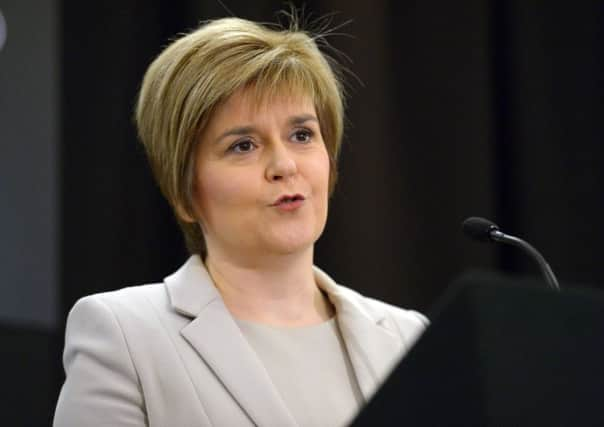Leaders: Now the difficulties begin for SNP


However, within days of winning 56 of Scotland’s 59 seats, there seemed to be a shifting of position, with First Minister Nicola Sturgeon saying that it could only be implemented over a period of years. This forecast was in contrast to full independence itself, which last year, pre-referendum, was timetabled as arriving 18 months after a Yes vote.
A week later, the retreat was gathering pace, with strong suggestions from within the party that there would be no fiscal autonomy amendment to the Scotland Bill, despite the earlier manifesto commitment. As would be expected, there was scorn and derision from political opponents. Part of this can be put down to the straightforward opportunity to score political points over a rival, but the jibes were also motivated by a belief that the SNP had worked out that it could be set up to fail: if Westminster granted full fiscal autonomy, a predicted annual Scottish shortfall of £7.6 billion would be the Nationalists’ downfall, and the ultimate aim of independence would then be destroyed.
Advertisement
Hide AdAdvertisement
Hide AdBut the position has changed again. Deputy party leader Stewart Hosie has confirmed a full fiscal autonomy amendment will be lodged after all, honouring the manifesto pledge.
It is obvious that there is disagreement within the SNP over how to proceed with this matter, with at least two prominent members of the new Westminster intake openly voicing doubts about fiscal autonomy. We may be seeing the first signs of how difficult it will be for the party to keep its vastly expanded numbers of elected members and ordinary members in tune. A further, greater internal challenge lies ahead, when the leadership has to find a way of dealing with the independence dilemma ahead of next year’s Holyrood elections: to commit to another referendum, or not.
The conflicting messages within the party over the wisdom of pursuing fiscal autonomy at this point are hardly likely to offer reassurance to the public that this would be a risk worth taking with the Scottish economy. However, it is unlikely that it will become reality. Although full fiscal autonomy could attract the support of a few Tory MPs who would gladly see the SNP fail, the amendment is not expected to be passed at Westminster. While granting autonomy might damage the SNP, it might do even greater damage to the economy.
The SNP has a lesson to learn here, ahead of next year’s election. With support running high in opinion polls, the party has to be absolutely sure about its commitment to the contents of its manifesto. At this important time, Scots must be certain about the choices they face.
The write place for a festival
SCOTLAND isn’t short of a book festival or two these days. Peter Snow and Andrew Marr will be among the highlights as the four-day Borders Book Festival opens in Melrose today. A couple of months ago we had the Aye Write! festival in Glasgow, and in September there is the Wigtown Book Festival. There are many others, including events in Dundee, Inverness and Ullapool.
With so much competition on its doorstep, it is just as well that the Edinburgh International Book Festival lives up to its full name. This year’s programme, announced yesterday, explores Scotland’s relationship with the rest of the world, and also attracts a record number of overseas authors. “I think it will be the most international book festival ever held in the UK,” says director Nick Barley.
The festival has also earned a reputation for civilised political debate, and this year’s guests include First Minister Nicola Sturgeon and former Prime Minister Gordon Brown.
Hot tickets are always snapped up fast, and perhaps one criticism is that the tents cannot ever be big enough to accommodate all those who would like to attend the one-off appearances of star attractions. But the Charlotte Square location is part of the attraction of this particular festival – a green space in the heart of the capital city, dedicated to books, with a unique atmosphere. All distractions are left behind when the visitor crosses the threshold.
Advertisement
Hide AdAdvertisement
Hide AdThere have been suggestions that the prime location could now be opened up to other events over the year. It is a proposal worth exploring, but it would be wise to leave the charm of the book festival untouched. It is a success story that delivers on its ambition year after year.